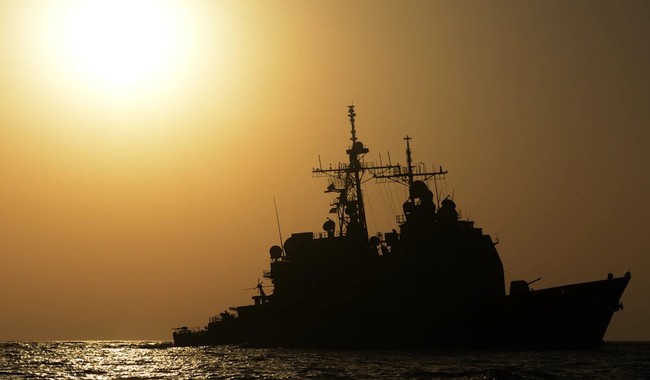We support our Publishers and Content Creators. You can view this story on their website by CLICKING HERE.

On Sunday, a US Navy F/A-18 Super Hornet flying off the USS Harry S. Truman in the Red Sea was shot down by friendly fire; see ‘Friendly Fire’ in the Skies Over the Red Sea Brings Down US F-18 Super Hornet. The aircraft, part of the “Red Rippers” of VFA-11, was about ten miles from the Truman on a final landing approach, having completed its mission of refueling a recently launched flight. The aircrew was alerted to an incoming missile and ejected before impact. The missile was an SM-2 surface-to-air weapon fired from the Aegis-equipped guided missile cruiser USS Gettysburg (CG64), the defensive center of the Truman carrier strike group.
Advertisement
What was already a disturbing picture became much more horrifying when it was revealed Tuesday that a second F/A-18 Super Hornet narrowly escaped the same fate.
On the same night a U.S. Navy fighter jet was shot down over the Red Sea, a second jet nearly suffered the same fate. An F/A-18 Super Hornet – flying a few miles behind the Hornet that was shot down – was forced to take evasive maneuvers after a second surface-to-air missile was fired from the cruiser USS Gettysburg, narrowly missing the second jet by 100 feet while it prepared to land aboard the aircraft carrier Harry S. Truman, a source with knowledge of the incident tells Fox News.
It is more than a little unclear how a radar system with the capacity to track hundreds of aerial contacts treated two friendly aircraft in a landing pattern as threats when the Truman strike group was not under attack. According to the report, pilots on the Truman are somewhat concerned about the level of training and discipline aboard the Gettysburg, “Navy pilots are angry about the incident and question the training aboard the USS Gettysburg, the source said, calling it ‘insufficient.'” Yep, I bet that is exactly what they called it.
The Navy is conducting an investigation, and surprisingly, the chain of command and everyone in the combat information center has not yet been frog-marched off the ship. However, I would expect that to happen in the very near future. I’m not an Aegis weapons expert, but from what I know, this should not have been possible without human intervention. The only other instance of an Aegis system mistakenly firing on an aircraft took place on July 3, 1988, when the “robo-cruiser,” USS Vincennes, shot down Iran Air Flight 655, killing 290 passengers and crew. In that case, the humans in the kill chain made assumptions about Flight 655, resulting in its identification as a hostile threat.
Advertisement

 Conservative
Conservative  Search
Search Trending
Trending Current News
Current News 





